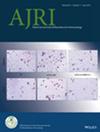Inflammatory Indices in First Trimester as Predictors of Gestational Diabetes Mellitus and Adverse Pregnancy Outcomes
Abstract
Objectives
To explore the association between systemic inflammatory markers (systemic inflammation response index [SIRI], systemic immune inflammation index [SII], interleukin [IL]-33, and soluble tumorigenicity 2 [sST2]) and gestational diabetes mellitus (GDM), as well as adverse pregnancy outcomes (APOs), and to assess the impact of glycemic control on these relationships.
Methods
A total of 777 participants were included, comprising 476 women with GDM and 301 without. Clinical characteristics, inflammatory markers, and pregnancy outcomes were analyzed. Logistic regression was employed to assess the risk of GDM and APOs associated with elevated inflammatory indices and glycemic control. Diagnostic performance was evaluated using receiver operating characteristic (ROC) curves.
Results
Women with GDM exhibited significantly higher levels of SII, SIRI, IL-33, and sST2. Multivariate logistic regression demonstrated that SII, SIRI, IL-33, and sST2 were independent predictors of GDM. Moreover, the highest tertiles of SII, SIRI, and IL-33 were strongly associated with APO risk. ROC analysis revealed that SII had the highest predictive value for GDM (AUC 0.763), while IL-33 had the greatest predictive accuracy for APOs (AUC 0.669). Effective glycemic control was associated with reduced inflammatory marker levels (SII, aOR 3.9; SIRI, aOR 3.7; IL-33, aOR 2.4) and a decreased risk of APOs and large-for-gestational-age (LGA) infants in women with GDM.
Conclusions
Elevated SII, SIRI, IL-33, and sST2 are significant predictors of GDM and APOs, with SII being the most robust predictor of GDM and IL-33 for APOs. Glycemic control reduces inflammation and may improve pregnancy outcomes in women with GDM.

 求助内容:
求助内容: 应助结果提醒方式:
应助结果提醒方式:


